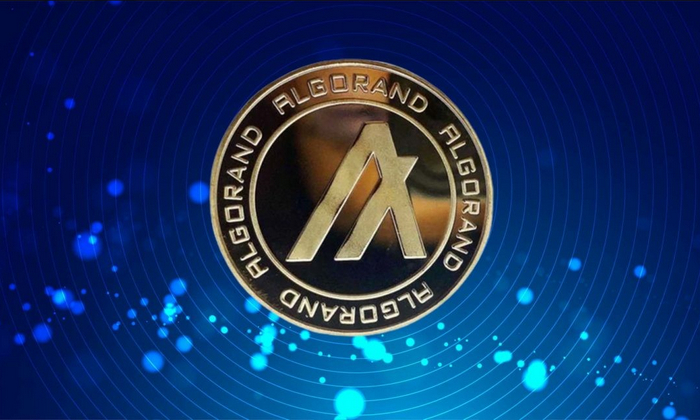-
 Bitcoin
Bitcoin $93,751.6685
0.74% -
 Ethereum
Ethereum $1,802.5606
2.95% -
 Tether USDt
Tether USDt $1.0003
-0.01% -
 XRP
XRP $2.2257
0.74% -
 BNB
BNB $606.7410
-1.08% -
 Solana
Solana $151.4623
1.71% -
 USDC
USDC $1.0001
0.02% -
 Dogecoin
Dogecoin $0.1789
0.84% -
 Cardano
Cardano $0.6995
2.74% -
 TRON
TRON $0.2464
-0.38% -
 Chainlink
Chainlink $15.0764
7.42% -
 Sui
Sui $2.9792
11.41% -
 Avalanche
Avalanche $22.4811
1.70% -
 UNUS SED LEO
UNUS SED LEO $9.1220
0.85% -
 Stellar
Stellar $0.2676
0.83% -
 Toncoin
Toncoin $3.1882
3.76% -
 Shiba Inu
Shiba Inu $0.0...01351
0.30% -
 Hedera
Hedera $0.1806
-0.30% -
 Bitcoin Cash
Bitcoin Cash $358.2626
-1.20% -
 Polkadot
Polkadot $4.1029
2.24% -
 Litecoin
Litecoin $83.3742
-0.30% -
 Hyperliquid
Hyperliquid $18.6386
-1.95% -
 Dai
Dai $1.0000
0.02% -
 Bitget Token
Bitget Token $4.5148
-1.43% -
 Ethena USDe
Ethena USDe $0.9995
0.00% -
 Pi
Pi $0.6647
2.71% -
 Monero
Monero $230.3669
2.36% -
 Uniswap
Uniswap $6.0792
4.98% -
 Pepe
Pepe $0.0...08863
1.27% -
 Aptos
Aptos $5.3822
2.38%
What is ALGO coin? Analysis of what ALGO coins mean
ALGO, the native cryptocurrency of the scalable and secure Algorand blockchain, serves as the unit of account for transaction fees, staking, and governance within the ecosystem.
Oct 30, 2024 at 05:01 am

What is ALGO Coin?
ALGO is the native cryptocurrency of the Algorand blockchain, a proof-of-stake (PoS) blockchain that aims to provide a fast, secure, and scalable platform for decentralized applications. ALGO coins are the unit of account on the Algorand blockchain and are used for transaction fees, staking, and governance.
Key Features of ALGO Coin
- High Transaction Speeds: Algorand claims to process transactions in seconds, with a theoretical maximum of 1,000 transactions per second (TPS).
- Low Transaction Fees: Transaction fees on Algorand are extremely low, typically less than 0.001 ALGO.
- Scalability: Algorand's unique consensus mechanism, Pure Proof-of-Stake (PPoS), allows the network to scale as more users join.
- Security: Algorand uses a combination of cryptographic techniques, including a Byzantine Agreement algorithm, to ensure the security of the blockchain.
- Governance: ALGO holders participate in the governance of the Algorand blockchain by voting on proposed changes to the protocol.
Use Cases of ALGO Coin
ALGO coins have several use cases within the Algorand ecosystem:
- Transaction Fees: ALGO is used to pay for transaction fees on the Algorand blockchain, ensuring the smooth functioning of the network.
- Staking: ALGO holders can stake their coins to earn rewards and support the security of the network. Stakers participate in the consensus process and help validate transactions.
- Governance: ALGO holders have the right to participate in the governance of the Algorand blockchain by voting on proposals and electing members to the Algorand Foundation, the non-profit organization that oversees the project.
- Smart Contracts: ALGO can be used to pay for the creation and execution of smart contracts on the Algorand blockchain.
- Decentralized Finance (DeFi): ALGO is used within the Algorand DeFi ecosystem, including decentralized lending, yield farming, and stablecoins.
Conclusion
ALGO coins play a crucial role in the Algorand ecosystem, providing the fuel for transactions, staking, governance, and various decentralized applications. With its high transaction speeds, low fees, scalability, security, and governance features, ALGO has attracted growing interest from developers and users. The utility and adoption of ALGO coins are expected to continue as the Algorand blockchain grows and more applications are built on its platform.
Disclaimer:info@kdj.com
The information provided is not trading advice. kdj.com does not assume any responsibility for any investments made based on the information provided in this article. Cryptocurrencies are highly volatile and it is highly recommended that you invest with caution after thorough research!
If you believe that the content used on this website infringes your copyright, please contact us immediately (info@kdj.com) and we will delete it promptly.
- ZKSync Recovers $5M Stolen in Airdrop Exploit by Reaching Agreement with the Hacker
- 2025-04-24 07:05:13
- 4 Best Crypto Must-Haves for 2025: Why BlockDAG Leads Over XLM, Hyperliquid, and ONDO; Find Out!
- 2025-04-24 07:05:13
- Donald Trump Launches a Cryptocurrency Venture That Promises Dinners with the President to Top 220 Holders of Its Memecoin
- 2025-04-24 07:00:12
- The NFT market experiences swift development as newer projects introduce competitive challenges to established collection rankings.
- 2025-04-24 07:00:12
- Australian bullion demand hit multi-month highs in March
- 2025-04-24 06:55:13
- Gold descends from the historic tops, but Bitcoin is not the new refuge
- 2025-04-24 06:55:13
Related knowledge

What is Ethereum’s Slashing mechanism and how to punish malicious behavior?
Feb 20,2025 at 03:08am
Key PointsOverview of slashingDifferent types of slashing in EthereumIncentives and consequences of slashingIdentifying and reporting slashed validatorsOngoing discussions and potential improvementsEthereum's Slashing Mechanism: Punishing Malicious BehaviorEthereum's slashing mechanism is an essential tool for ensuring network security and punishing mal...

What is the verifier node of Ethereum and how to become a verifier?
Feb 19,2025 at 06:00pm
The Verifier Node of Ethereum: A Comprehensive GuideKey Points:What is a Verifier Node?How to Become a Verifier NodeResponsibilities and Rewards of a Verifier NodeMinimum Requirements for Becoming a Verifier NodePotential Difficulties in Running a Verifier Node1. What is a Verifier Node?A Verifier Node is an independent entity on the Ethereum network th...

What is Ethereum’s staking, and how to participate and earn money?
Feb 19,2025 at 04:37pm
Key Points:Understanding Ethereum's Staking MechanismSteps to Participate in StakingBenefits and Rewards of StakingSecurity and Risk ConsiderationsTechnical Requirements and Hardware OptionsPotential Challenges and Troubleshooting TipsFAQs on Ethereum StakingWhat is Ethereum's Staking?Proof-of-Stake (PoS) is a consensus mechanism used in blockchain netw...

What is Ethereum’s DAO (Decentralized Autonomous Organization) and how does it work?
Feb 20,2025 at 03:12am
Key PointsDefinition and Structure of a DAOGovernance and Decision-Making in DAOsBenefits and Use Cases of DAOsChallenges and Limitations of DAOsWhat is Ethereum's DAO (Decentralized Autonomous Organization) and How Does It Work?Definition and Structure of a DAOA Decentralized Autonomous Organization (DAO) is an innovative governance and management fram...

What is Ethereum's multi-signature wallet and how to improve security?
Feb 20,2025 at 02:18pm
Key Points:Understanding the Concept of a Multi-Signature WalletBenefits and Drawbacks of Multisig WalletsRequirements for Setting Up a Multisig WalletStep-by-Step Guide to Generating a Multisig WalletImplementing Strategies for Enhanced Security1. Understanding the Concept of a Multi-Signature WalletA multi-signature (multisig) wallet in the Ethereum e...

What is Ethereum's oracle and how to provide data for smart contracts?
Feb 21,2025 at 01:30am
Key Points:Understanding the concept of oracles in EthereumExploring different types of oraclesDetailed guide on how to provide data for smart contractsAddressing potential challenges and considerationsWhat is Ethereum's Oracle?Oracles are crucial components in the Ethereum ecosystem, enabling smart contracts to access real-world data and off-chain even...

What is Ethereum’s Slashing mechanism and how to punish malicious behavior?
Feb 20,2025 at 03:08am
Key PointsOverview of slashingDifferent types of slashing in EthereumIncentives and consequences of slashingIdentifying and reporting slashed validatorsOngoing discussions and potential improvementsEthereum's Slashing Mechanism: Punishing Malicious BehaviorEthereum's slashing mechanism is an essential tool for ensuring network security and punishing mal...

What is the verifier node of Ethereum and how to become a verifier?
Feb 19,2025 at 06:00pm
The Verifier Node of Ethereum: A Comprehensive GuideKey Points:What is a Verifier Node?How to Become a Verifier NodeResponsibilities and Rewards of a Verifier NodeMinimum Requirements for Becoming a Verifier NodePotential Difficulties in Running a Verifier Node1. What is a Verifier Node?A Verifier Node is an independent entity on the Ethereum network th...

What is Ethereum’s staking, and how to participate and earn money?
Feb 19,2025 at 04:37pm
Key Points:Understanding Ethereum's Staking MechanismSteps to Participate in StakingBenefits and Rewards of StakingSecurity and Risk ConsiderationsTechnical Requirements and Hardware OptionsPotential Challenges and Troubleshooting TipsFAQs on Ethereum StakingWhat is Ethereum's Staking?Proof-of-Stake (PoS) is a consensus mechanism used in blockchain netw...

What is Ethereum’s DAO (Decentralized Autonomous Organization) and how does it work?
Feb 20,2025 at 03:12am
Key PointsDefinition and Structure of a DAOGovernance and Decision-Making in DAOsBenefits and Use Cases of DAOsChallenges and Limitations of DAOsWhat is Ethereum's DAO (Decentralized Autonomous Organization) and How Does It Work?Definition and Structure of a DAOA Decentralized Autonomous Organization (DAO) is an innovative governance and management fram...

What is Ethereum's multi-signature wallet and how to improve security?
Feb 20,2025 at 02:18pm
Key Points:Understanding the Concept of a Multi-Signature WalletBenefits and Drawbacks of Multisig WalletsRequirements for Setting Up a Multisig WalletStep-by-Step Guide to Generating a Multisig WalletImplementing Strategies for Enhanced Security1. Understanding the Concept of a Multi-Signature WalletA multi-signature (multisig) wallet in the Ethereum e...

What is Ethereum's oracle and how to provide data for smart contracts?
Feb 21,2025 at 01:30am
Key Points:Understanding the concept of oracles in EthereumExploring different types of oraclesDetailed guide on how to provide data for smart contractsAddressing potential challenges and considerationsWhat is Ethereum's Oracle?Oracles are crucial components in the Ethereum ecosystem, enabling smart contracts to access real-world data and off-chain even...
See all articles
























































































